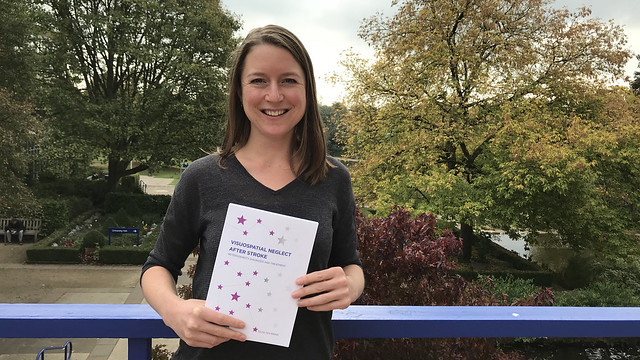Research Associate Dr Teuni ten Brink from the Department of Psychology and Centre for Pain Research, has won the PhD dissertation prize from the Nederlandse Vereniging voor Neuropsychologie (Dutch Association for Neuropsychology).
Titled Visuospatial neglect after stroke: Heterogeneity, diagnosis and treatment, Dr ten Brink’s dissertation aims to better understand and treat visuospatial neglect, a frequent and disabling disorder in lateralised attention.
In collaboration with Professor Anne Visser-Meily and Dr Tanja Nijboer, Dr ten Brink evaluated the long-term effects of early treatment with a behavioural therapy on neglect behaviour in daily life.
Dr Teuni ten Brink completed her PhD at the Centre of Excellence for Rehabilitation Medicine Utrecht, the Netherlands, where she studied disorders of attention in stroke patients. She joined Bath this summer after receiving a Dutch grant to conduct research at the University for two years. She is currently working with Dr Janet Bultitude from Bath's Department of Psychology, to improve the diagnosis of attention problems in people suffering from Complex Regional Pain Syndrome (CRPS).
Upon receiving her neuropsychology award, Dr ten Brink said: "It means a lot to me to receive this dissertation prize from the Dutch Association for Neuropsychology, as it is the most important Dutch award in my field. The research in my thesis is both applied and fundamental, making it a contribution to clinical practice and science in general.”
Dr Janet Bultitude added: “It’s fantastic to see Dr ten Brink’s research recognised with this award. She has produced outstanding work that has greatly improved our understanding of attention problems after stroke and how they can be treated. Dr ten Brink is now turning her expertise to addressing another important health problem - chronic pain - and I am delighted to have such a talented researcher join us at the University of Bath.”
There is evidence that pain can be reduced by redirecting the attention to the affected side. This attention bias is however, poorly understood. Over the next two years, Dr ten Brink and Dr Bultitude will develop sensitive tests for this attention bias in CRPS, which could eventually aid treatment.

